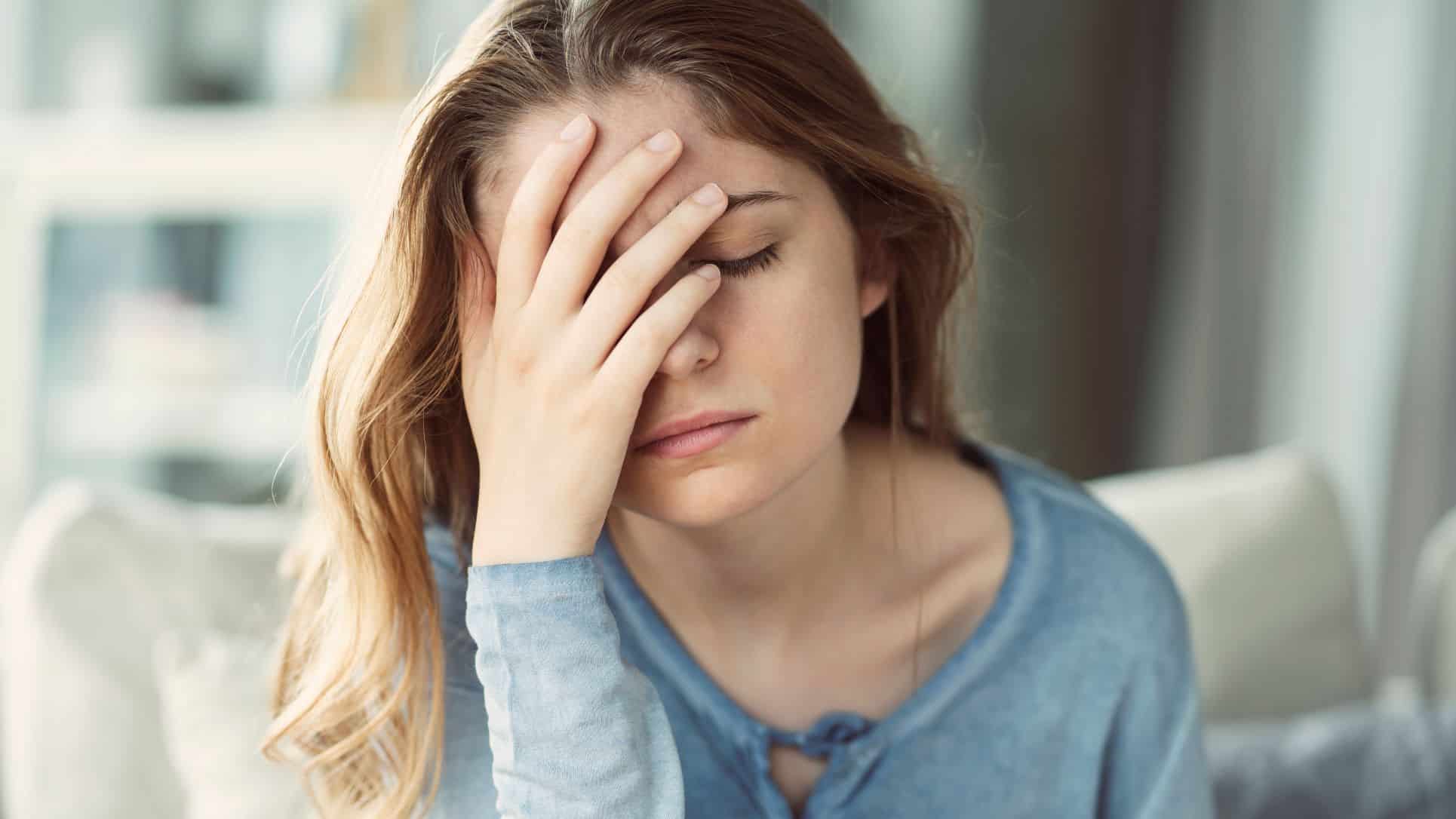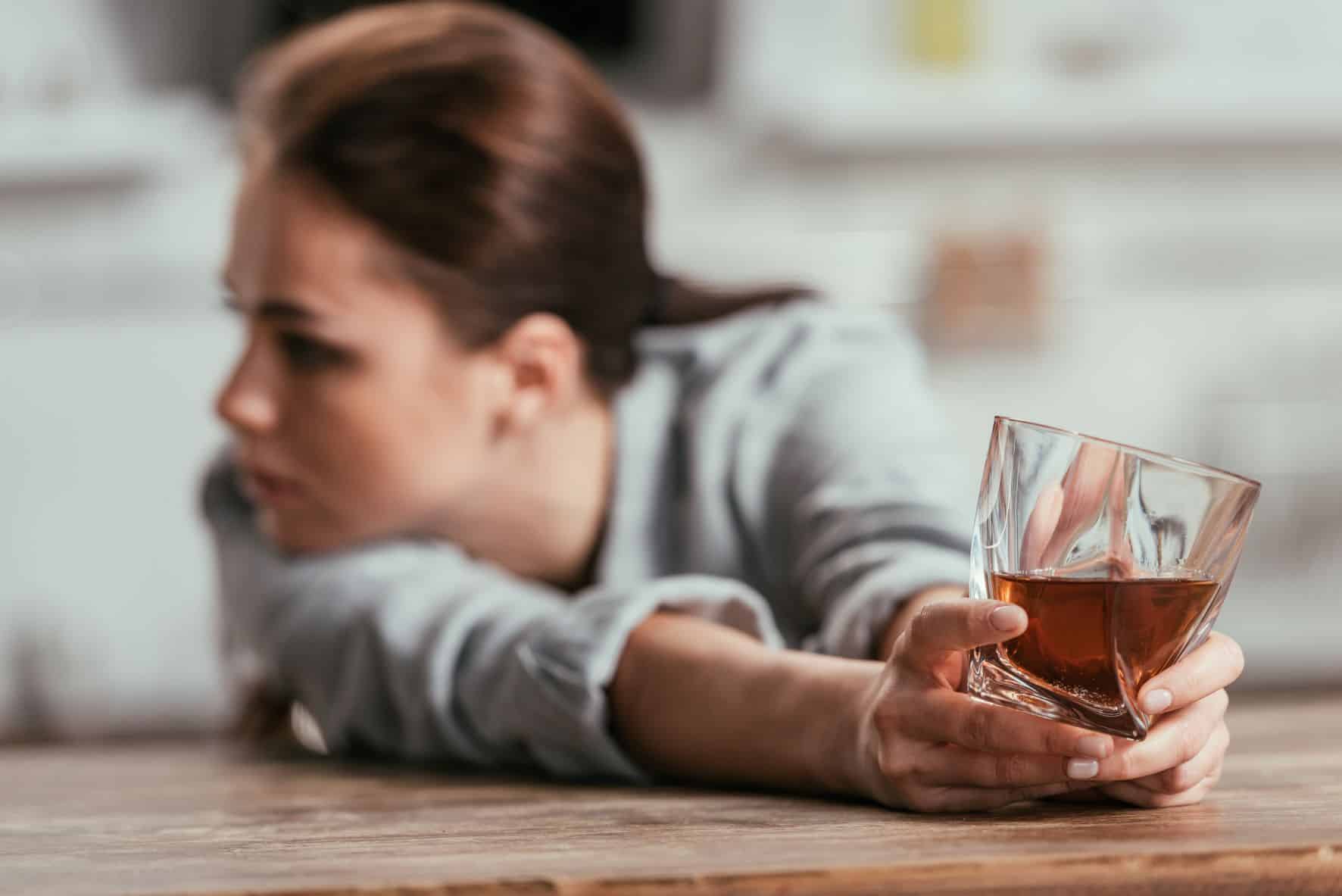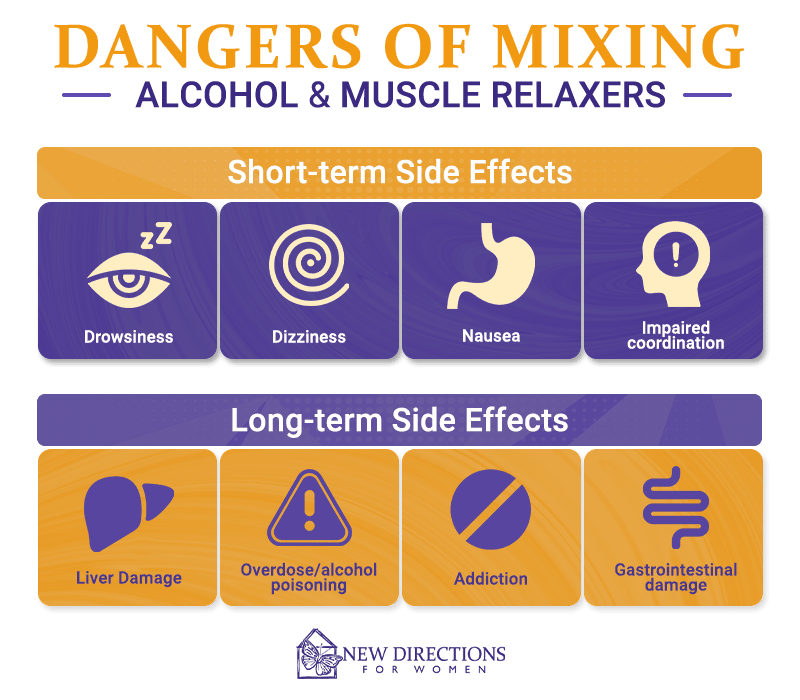There may come a time in your life when you require a prescription for a muscle relaxer. If you drink, you may wonder whether it’s safe to mix alcohol with your muscle relaxers.
Like most medications, muscle relaxers pose interaction risks, and bringing alcohol into the mix can be dangerous—even lethal. If you’re thinking about mixing these substances, it’s important to understand the risks involved. At New Directions for Women, we want you to be as informed as possible so you can be empowered to live life to the fullest. In this blog, we break down the relationship between muscle relaxers and alcohol and why the two should never be mixed.

What Are Muscle Relaxers?
Muscle relaxers are prescription medications that help relieve pain. They specifically target muscle spasms and muscle spasticity. While there are many different types of muscle relaxers, they all work in a similar manner. Muscle relaxers block nerve impulses that cause painful muscle contractions. These drugs can include the following prescriptions:
- Carisoprodol (Soma)
- Tizanidine (Zanaflex)
- Metaxalone (Skelaxin)
- Orphenadrine (Norflex)
- Chlorzoxazone (Lorzone)
- Methocarbamol (Robaxin)
- Cyclobenzaprine (Flexeril)
- Baclofen (Gablofen, Lioresal)
During a muscle spasm, muscles contract and tighten involuntarily (or on their own). This can cause intense pain and discomfort. To relieve this pain, many people take muscle relaxers which relax the muscle and prevent spasms from occurring.
When it comes to muscle spasticity, this works a little differently. Rather than a single spasm, muscle spasms continually occur. This leads to feelings of tightness and stiff muscles. For many people, this makes it hard to move or even walk. Muscle spasticity is common in people who have conditions such as cerebral palsy or in people who have had an injury to their brain or spinal cord.
Effects of Muscle Relaxers
Muscle relaxers are central nervous system depressants. They work by either blocking the nerve impulses or by narrowing the blood vessels to the muscles. When these drugs are used for an extended period of time, they can cause side effects like drowsiness and dizziness. In addition, some muscle relaxers can interfere with kidney function and even lead to liver damage if taken in high doses over a long period of time.
Further side-effects caused by muscle relaxers include the following:
- Skin rash
- Weakness
- Depression
- Impaired thinking
- Low blood pressure
- Quickened heart rate
- Drowsiness and fatigue
- Headache and vision troubles
- Upset stomach, nausea, and vomiting
- Unsteadiness, dizziness, and clumsiness
The side effects of this drug should make it clear why someone should not mix alcohol and muscle relaxers. On their own, this drug produces many side effects that affect a person’s ability to function. When alcohol is added to the mix, these side effects become even more pronounced, potentially leading to serious health problems.
The Effects of Alcohol
Since we have covered the effects of muscle relaxers, it is also important to understand the effects of alcohol. When someone drinks, alcohol is absorbed into the bloodstream and quickly travels to the brain. Here, alcohol interferes with the neurotransmitters that send messages between cells. This disruption leads to feelings of relaxation and sedation.

As alcohol continues to enter the bloodstream, it begins to have other effects on the body. Muscle coordination becomes impaired, which is why people are unable to drive or operate machinery while under the influence of alcohol. It can also lead to slurred speech, vomiting, and decreased inhibitions.
Importantly, alcohol is a powerful nervous system depressant, which means that it slows down activity in the brain and central nervous system. This can alter perception, behavior, and movement in potentially dangerous ways. While alcohol’s effects may be desirable in some situations, they can be dangerous in others.

The Effects of Mixing Alcohol and Muscle Relaxers
When alcohol and muscle relaxers are mixed together, the effects can be quite dangerous. Not only do muscle relaxers and alcohol both have sedative effects on the body, but they also share common side effects such as dizziness, drowsiness, nausea, and impaired coordination. When a person takes alcohol and muscle relaxers together, the effects of these drugs become even stronger.
Mixing alcohol with muscle relaxers has different effects in both the short and long term. In the short term, there are many concerning effects. These mostly have to do with impairment and motor control. Some of these effects are:
- Dizziness
- Drowsiness
- Nausea
- Impaired coordination
All of these effects make it dangerous to operate machinery or drive a car. It is also easy to fall and hurt yourself if you are not careful. Poor vision and confusion are also a risk for people who mix alcohol and muscle relaxers.
The ability of these drugs to depress the central nervous system can lead to the inability to think clearly. Individuals may experience impaired judgment, dangerous mood swings, and even aggressive behaviors.
While the short-term effects of mixing these two substances together are serious, the long-term effects are even more concerning. As with any substance, a significant risk is posed by continually ingesting a drug. This goes for many prescription medications and for alcohol.
Many internal organs experience damage due to mixing these substances. Further, mixing alcohol and muscle relaxers puts women at an increased risk of developing a substance use disorder. Other dangers include the following:
- Liver damage: Mixing alcohol and muscle relaxers will cause damage to the liver. When these substances are both present in the body, the liver—which is responsible for processing both—works overtime.
- Addiction: Combining muscle relaxers and alcohol can lead to addiction. This is because both substances act on the brain’s reward center, causing a person to feel pleasurable effects.
- Overdose: Mixing alcohol with muscle relaxers can also lead to an overdose. This is especially true if a person takes more than the recommended amount of either substance. Respiratory depression can occur, causing an individual to stop breathing.
- Alcohol poisoning: Combining muscle relaxers with alcohol can also cause alcohol poisoning. This is a serious, potentially life-threatening condition that occurs when a person drinks too much alcohol in a short period of time. Symptoms include vomiting, seizures, and blackouts.
- Gastrointestinal damage: Prescription medication and alcohol both cause damage to the GI tract. Over time, alcohol can cause inflammation and scarring in the lining of the GI tract. While muscle relaxers are often used to reduce intense abdominal pain, over time they can have negative side effects such as ulcers, hemorrhoids, constipation, or diarrhea.
Overall, it is clear that alcohol and muscle relaxers should not be mixed together. Whether you are taking these substances for recreational or medical reasons, the potential negative consequences far outweigh any perceived benefits.
What to Do if You’ve Mixed Muscle Relaxers and Alcohol
If you or a loved one have mixed muscle relaxers and alcohol, follow these steps immediately to ensure the safety and well-being of the affected individual.
- Seek Medical Help: Call emergency services (911 in the US) or take the person to the nearest emergency room. Do not wait for symptoms to appear; it’s better to be overly cautious.
- Provide Information: Be honest with medical professionals about what substances were consumed and in what quantities. This information will help them provide the appropriate treatment.
- Monitor Vital Signs: Keep an eye on the person’s breathing, pulse, and level of consciousness while waiting for medical help to arrive. If they become unconscious or their breathing becomes shallow or irregular, begin CPR if you’re trained to do so.
- Do Not Leave Them Alone: Stay with the person until medical help arrives. If they lose consciousness, place them in the recovery position to prevent choking in case of vomiting.
- Avoid Further Intake: Do not allow the person to consume any more alcohol or muscle relaxers.
- Follow Medical Advice: Once medical help arrives, follow the instructions of the healthcare professionals. They may administer treatments such as activated charcoal or intravenous fluids to help rid the body of the substances and stabilize the person’s condition.
- Prevent Future Incidents: After the situation has been resolved, have an open and honest conversation about the dangers of mixing muscle relaxers and alcohol, and encourage seeking help if there’s a problem with substance use.
Why Women Mix Alcohol and Muscle Relaxers
Engaging in polysubstance abuse (taking more than one drug at a time) happens for many reasons. Some people mix substances to amplify the effects of one or both drugs, while others do it to offset the negative side effects of another. Still, others mistakenly believe that combining drugs will somehow make them safer.
For women, there is often an added layer of complexity when it comes to polysubstance abuse. Many women who struggle with addiction face different risks than men. This includes a greater likelihood of being prescribed multiple medications on average and a higher rate of comorbid mental health disorders.
Some of the reasons a woman may mix muscle relaxers and alcohol include the following:
Many people abuse substances to feel “high.” This can be especially true for people who abuse alcohol and muscle relaxers. Some people may drink alcohol or use muscle relaxers in an attempt to alleviate negative feelings, such as stress or sadness.
Unfortunately, alcohol abuse is common among those who live with mental health conditions. They may drink to numb overwhelming feelings or as a coping mechanism. Muscle relaxers may also be abused in an attempt to self-medicate. Unfortunately, this is not a long-term solution and it cannot take the place of mental health treatment.
Alcohol and muscle relaxers can both increase the effects of other drugs. For instance, alcohol can make the effects of sedatives more potent. Muscle relaxers can also intensify the effects of alcohol.
Some women who mix muscle relaxers with alcohol may do so by mistake. If you’re taking a muscle relaxer for pain relief, it may not occur to you that alcohol could interact with the medication. Or, you may be unaware that your alcohol consumption is putting you at risk for dangerous side effects.
Substance Abuse Treatment at New Directions for Women
Given the dangerous nature of mixing alcohol and muscle relaxers, it is important that people understand why this should never be done. If you are struggling with polysubstance abuse, there is hope.

At New Directions for Women, we offer comprehensive care in a gender-specific environment. Our alcohol and drug treatment programs meet the unique needs of women, and we offer a variety of addiction treatment options that can help you take back control of your life.
If you or a woman in your life needs help ending the cycle of addiction, contact us today. We can help you or your loved one overcome a substance use disorder.
Frequently Asked Questions About Mixing Muscle Relaxers with Alcohol
How long after taking a muscle relaxer can I drink alcohol?
It’s best to wait until the effects of the muscle relaxer have worn off completely before consuming alcohol. This could take several hours depending on the specific medication and individual metabolism.
Are there certain muscle relaxers that should never be mixed with alcohol?
Most muscle relaxers should not be mixed with alcohol due to the increased risk of side effects. However, it’s especially important to avoid combining alcohol with potent muscle relaxants like baclofen, carisoprodol, and cyclobenzaprine.
Can mixing alcohol with muscle relaxers be fatal?
Yes, combining alcohol with muscle relaxers can be life-threatening, especially in high doses or in individuals with pre-existing health conditions. It can lead to respiratory depression, coma, and death.
What are the symptoms of alcohol and muscle relaxer overdose?
Symptoms of overdose may include extreme drowsiness, confusion, shallow breathing, slowed heart rate, fainting, and loss of consciousness. If you suspect an overdose, seek immediate medical attention.
Is it safe to drive or operate machinery after mixing alcohol with muscle relaxers?
No, it’s not safe. Both alcohol and muscle relaxers can impair cognitive and motor functions, increasing the risk of accidents. It’s best to avoid driving or operating machinery until you’re sure the effects of both substances have worn off.
Should I consult my doctor before mixing alcohol with muscle relaxers?
Yes, it’s important to talk to your doctor or pharmacist before combining alcohol with any medication, including muscle relaxers. They can provide personalized advice based on your medical history and the specific medication you’re taking.
What should you not take with muscle relaxers?
Avoid combining muscle relaxers with alcohol, opioids, benzodiazepines, or other central nervous system depressants.
Can you drink alcohol with the muscle relaxer Tizanidine?
No, drinking alcohol with tizanidine is not recommended because it can enhance drowsiness and dizziness, increasing the risk of accidents and respiratory depression.












